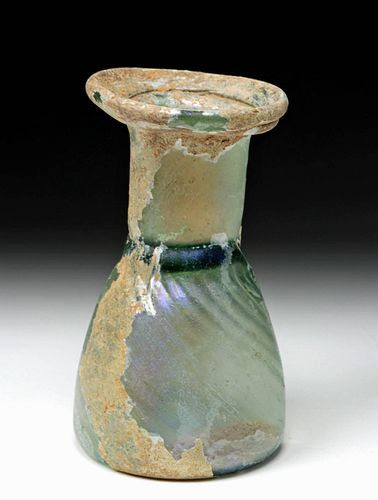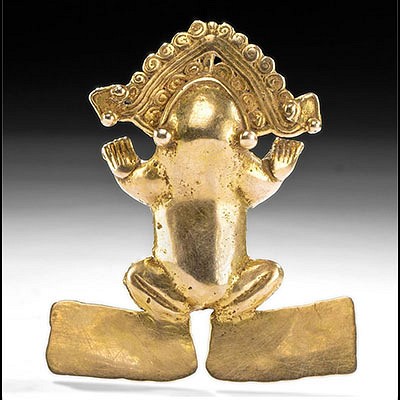Roman Green Glass Iridescent Sprinkler Flask
Lot 34d
About Seller
Artemis Fine Arts
686 S Taylor Ave, Ste 106
Louisville, CO 80027
United States
Selling antiquities, ancient and ethnographic art online since 1993, Artemis Gallery specializes in Classical Antiquities (Egyptian, Greek, Roman, Near Eastern), Asian, Pre-Columbian, African / Tribal / Oceanographic art. Our extensive inventory includes pottery, stone, metal, wood, glass and textil...Read more
Categories
Estimate:
$800 - $1,200
Absentee vs Live bid
Two ways to bid:
- Leave a max absentee bid and the platform will bid on your behalf up to your maximum bid during the live auction.
- Bid live during the auction and your bids will be submitted real-time to the auctioneer.
Bid Increments
| Price | Bid Increment |
|---|---|
| $0 | $25 |
| $300 | $50 |
| $1,000 | $100 |
| $2,000 | $250 |
| $5,000 | $500 |
| $10,000 | $1,000 |
| $20,000 | $2,500 |
| $50,000 | $5,000 |
| $100,000 | $10,000 |
| $200,000 | $20,000 |
About Auction
By Artemis Fine Arts
Aug 13, 2020
Set Reminder
2020-08-13 10:00:00
2020-08-13 10:00:00
America/New_York
Bidsquare
Bidsquare : Fine Antiquities, Ethnographic & Fine Art
https://www.bidsquare.com/auctions/artemis-gallery/fine-antiquities-ethnographic-fine-art-5415
Features classical antiquities, ancient and ethnographic art from cultures encompassing the globe. Egyptian, Greek, Roman, Etruscan, Near Eastern, Asian, Pre-Columbian, Native American, African / Tribal, Oceanic, Spanish Colonial, Russian, Fine Art, so much more! Artemis Fine Arts info@artemisfinearts.com
Features classical antiquities, ancient and ethnographic art from cultures encompassing the globe. Egyptian, Greek, Roman, Etruscan, Near Eastern, Asian, Pre-Columbian, Native American, African / Tribal, Oceanic, Spanish Colonial, Russian, Fine Art, so much more! Artemis Fine Arts info@artemisfinearts.com
- Lot Description
Roman, Imperial Period, ca. 2nd to 4th century CE. A fabulous free-blown glass sprinkler flask with a concave base and rough pontil. The vessel, comprised of delicate pale-green glass, has a piriform body with several diagonal ribs flowing gently towards the base. The neck base is pinched, with an extremely narrow interior hole characteristic of sprinkler flasks; it also has a tubular neck with a folded and flared rim. The applied slender ring around the interior of the neck was designed to constrict it to ensure that the precious contents, like scented oils or perfumes, would not spill or could not be poured too quickly. Lovely areas of fiery rainbow-hued iridescence grace the surface and give a lovely complementarity to the color of the vessel itself. Size: 3.75" H (9.5 cm).
Most scholars agree, Roman glass was of the highest quality -both aesthetically and technically - among the ancients. While glass making had been practiced for centuries, the Romans invented glass blowing in the 1st century BCE which revolutionized the artform. We can appreciate such a wide variety of forms and shapes, because the medium of glass has unique physical properties that make for so many more possibilities than metal or clay. Roman glassmakers reached incredible artistic heights with both free-blown vessels and mould blown forms and decorations.
Provenance: private Dere collection, East Coast, USA assembled between 1970 and 2000
All items legal to buy/sell under U.S. Statute covering cultural patrimony Code 2600, CHAPTER 14, and are guaranteed to be as described or your money back.
A Certificate of Authenticity will accompany all winning bids.
We ship worldwide and handle all shipping in-house for your convenience.
#129811Age-commensurate surface wear, with small hairline fissures near neck and rim. Small cracks are indicative of iridescence flaking. Nice earthen deposits and rainbow iridescence overall.Condition
- Shipping Info
-
All shipping is handled in-house for your convenience. Your invoice from Artemis Gallery will include shipping calculation instructions. If in doubt, please inquire BEFORE bidding for estimated shipping costs for individual items.
-
- Buyer's Premium



 EUR
EUR CAD
CAD AUD
AUD GBP
GBP MXN
MXN HKD
HKD CNY
CNY MYR
MYR SEK
SEK SGD
SGD CHF
CHF THB
THB
















